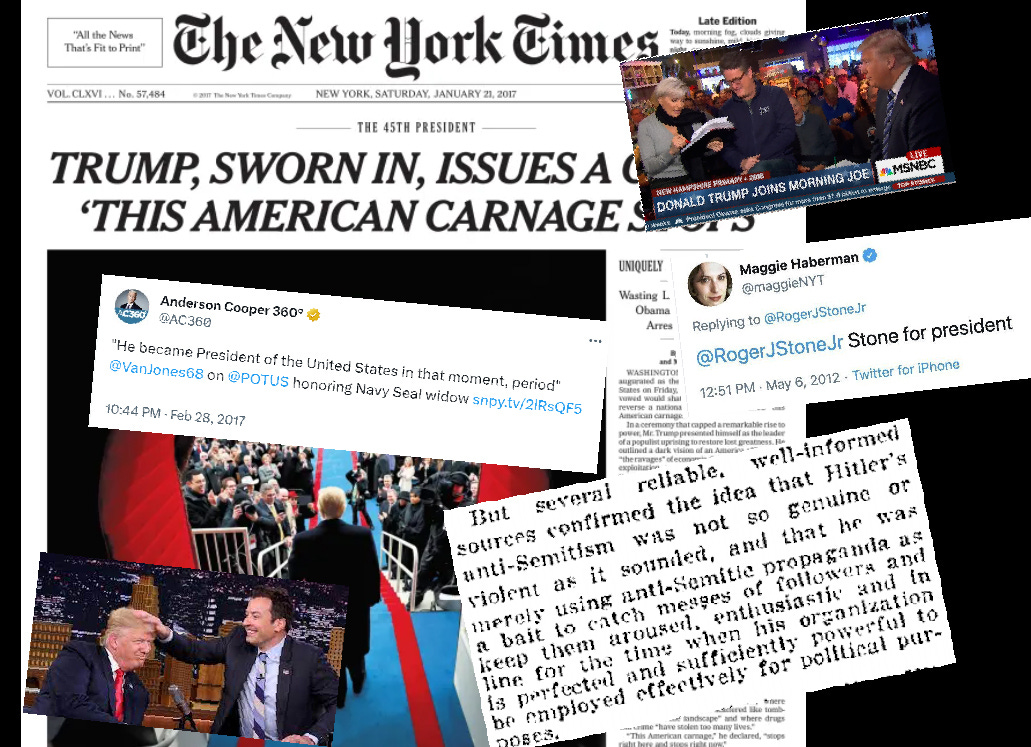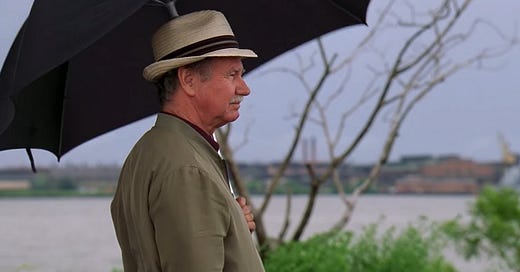
Stop the Press...From Failing Again (with Steven Beschloss)
In 2016, the Fourth Estate crapped the bed. Are they doing a better job this time?
When Donald Trump crossed over from reality TV to politics in 2015, the mainstream media could not figure out how to cover him. Already famous, he’d been a public figure for decades: first as a fixture in the New York tabloids, then as a casino owner and real estate magnate, and finally as the star of The Apprentice, the vacuous reality show on NBC. So he wasn’t some unknown bursting onto the national scene, like Sarah Palin or AOC or, more recently, Vivek Ramaswamy or Mike Johnson. The press didn’t need to tell us who he was—or, to be more accurate, what his cultivated public persona was. We were all familiar with his bombastic personality, his real estate holdings, his three wives, and his insipid catchphrase (“You’re fired!”).
Nor was he a traditional politician, a Mitt Romney or a Joe Biden. On the campaign trail, Trump bragged about being self-funded. Free from the grip of special interest groups and big donors, he could do what he wanted, say what he wanted. He was beholden to no one. For a lot of the drain-the-swamp crowd, that was a big selling point. (It was horseshit, of course, like most of the stuff he said. Eight years later, those initial lies seem almost quaint.)
In short, Trump didn’t fit into any of the existing templates, so the national press didn’t know what to make of him. There had been celebrities running for office before, some of them quite successfully: Ronald Reagan was an actor; Jesse “The Body” Ventura, a professional wrestler; Bill Bradley, a key contributor on two NBA champion Knicks teams. But there was no one quite like Donald Trump. How to cover the presidential campaign of—in the mot juste phrasing of President Obama—a carnival barker? The answer the media gave us in 2015-16 was: badly.
Trump wasn’t reported on the way other Republican hopefuls were. There were the normal, boring candidates—the Marco Rubios and Jeb Bushes and Ted Cruzes—and there was Trump. He existed in a different universe. The press viewed him as a curiosity. No one thought he could actually win. His campaign was treated like just another reality TV show. What happens when an upstart New York playboy billionaire decides to run for president? Tune in and find out! The media loved it because it was rocket fuel for ratings. As CBS chairman Les Moonves infamously put it in February of 2016, “It may not be good for America, but it’s damn good for CBS.”
The New York media knew what he was, knew about his mob connections, his affairs, his dealings with Russian organized crime figures. But even the New York Times, the alleged paper of record, treated him like a matinee idol, not a guy who might one day possess the nuclear launch codes (and then try to sell them to the Saudis). Having Maggie Haberman cover Trump was like having Ahmad Rashad cover Michael Jordan: there would be incredible access, sure, but because of that incredible access, the reporting could not be dependably objective. Too, plenty of national media pundits—looking at you, Chris Cillizza—positively drooled over Ivanka Trump, who seduced them with her charm, her looks, and her undeserved reputation as a moderating influence on her old man.
This is not to say that every media member failed. Far from it! Everything we learned about Trump’s crooked business dealings, his history of sexual assault, his campaign’s footsie-playing with the Russians, and so on, we learned from crack reporters doing good work. #NotAllJournalists! Plenty of media members got it right. Plus, a healthy part of this was Trump’s deliberate exploitation of the conventional norms. All politicians—even George “I Cannot Tell A Lie, Pa” Washington—play fast and loose with the truth sometimes, cherry-picking facts to support their narrative. It’s part of the job. On the scale of liars, however, Trump is closer to George Santos than George Washington. He is a lying sack of shit, and since lying sacks of shit of that magnitude don’t typically run for president, the press treated him with unearned deference and respect.
“You know, it’s almost a matter of a social convention first,” says the journalist and America, America columnist Steven Beschloss, my guest on today’s PREVAIL podcast. “People feel the need to be courteous, and even to assume that people will do the right thing eventually—and if they do the wrong thing, that it’s an error, that it’s not who they are.”
Plenty of people in both the pundit class and the Republican Party believed that the presidency would transform Trump. It did not—at least, not in the way they hoped. When Van Jones said in February 2017, after Trump honored the widow of a Navy SEAL, “He became President of the United States in that moment, period,” the CNN commentator was trying to speak into existence something that simply was not there and never would be.
“It’s taken an awfully long time for people to get over this idea that when he’s pouring out all of his lies day after day after day, and they’re just being called ‘claims,’ or gently ‘falsehoods,’” Beschloss tells me. “Or just not saying that lies are lies. That was one thing the New York Times, the Washington Post—all of the major papers took a long time before they called lies lies. And it’s that kind of attempted neutrality, but courtesy, which is just exactly the place that Trump has loved to and does by instinct exploit.”
As a result, the picture projected of Trump in 2016 was divorced from reality. The media was supposed to vet Donald Trump, and they failed to adequately do so. As a result, over a million Americans died of covid-19, Trump’s SCOTUS appointees helped overturn Roe, and we were one improbable moment of Mike Pence courage away from a successful overthrow of the government.
It definitely was not good for America, Mr. Moonves.
Now Trump is running again. The media is not making the same egregious mistakes, but the coverage is still lacking. Too much emphasis is on the horse-race, the polls, the winners and losers. Unable to break the ingrained habit of both-sidesing everything, journalists routinely equate some minor Joe Biden gaffe to Trump stealing classified documents.
“The tradition of so-called objectivity or so-called neutrality—the desire to show what both sides are on any given topic and not necessarily weighing in on what’s right or wrong, what’s true or false—I think that that’s worked against being able to address this guy in the way that he needed to be addressed,” Beschloss says. “Because he’s not playing the game that everyone else is, and so the rules do not apply.”
And while some opinion writers—Will Bunch, of course, and most notably Robert Kagan—have called out Trump as a fascist wannabe dictator, most journalists have eschewed the f-word. As Beschloss puts it, they are “using language to soften the danger.”
But the danger is real. The call is coming from inside the house. Trump is a fascist; he’s said, more than once, that he plans to rule as a dictator; he has followers who will enable him; he plans, ominously, to post the U.S. military in vast numbers at the border; and our institutions may not be strong enough to survive another Trump term. A second dose of Agent Orange would be fatal to democracy.
But there is still hope. We haven’t choked down the Trump poison quite yet.
“Those outcomes are not inevitable,” Beschloss says. “The majority of the country still believes in democracy, even if that majority is waning. The majority of the country still wants compassion and decency in public life. I think that there’s enough that’s on our side, that if we can continue to expand people’s capacity to imagine the future, right, what that future looks like, then we just might be able to motivate enough people to get off their couches and do something.”
LISTEN TO THE PODCAST
Greg Olear is joined by the writer, author, professor, filmmaker, and “America, America” columnist Steven Beschloss. They discuss the failure of the media to adequately cover Trump, then and now; the stakes of the next election; Lee Harvey Oswald, childhood trauma, and the making of an assassin; the importance of investing in education and why the GOP opposes it; Biden’s place in history; and the Ritz-Carlton Moscow. Plus: a new dating app.
Follow Steven:
https://twitter.com/StevenBeschloss
https://post.news/@/stevenbeschloss
Subscribe to “America, America”:
Watch “Media Misses”:
Buy his book:
https://www.amazon.com/Gunman-His-Mother-Marguerite-Assassin-ebook/dp/B0CN518F1K


















Hopefully as the election gets closer the media will not be afraid to call Donald out. Is he really that entertaining? No.
Do we need another attempted coup on America? NO.
The Maga people, including the majority of my elderly family members, worship him. What they don't understand is the disdain I feel for the fascicist in our midst and how I will do everything in my little world to not have our country run by him or others like him again.
And thank you Greg... for you, LB, and other like-minded folks getting me (and our country) through another election with him as the gop nominee. It's going to be a long year.
#TGIF🎉🎉🎉Wondering when the media will also start investigating, and then reporting on, the GOP taking up Putin’s agenda. Why, it’s almost like the GOP is actively working to destroy America and democracy from the inside. Cue Nikita Kruschev.